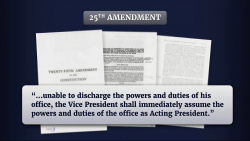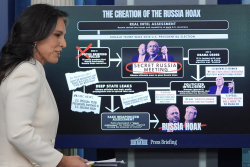Without a coherent Middle East strategy, the Trump administration risks losing America’s ability to guide events in the region.
After it has completed its operations in Iran, Israel will have an incredible ability to influence the future direction of the region. America can withdraw and cede control to Israel, or it can put forward a vision for the Middle East in which the United States is active and engaged. If the Trump administration simply stands by and watches the destruction take place, it will have no say in what emerges from the conflict.
Operation Rising Lion
Last night, Israel successfully carried out the first stage of a multi-level operation to decapitate Iran’s military leadership, destroy its ballistic missiles and air defenses, and demolish large parts of its nuclear program. The goal is to remove any immediate threat from Iran and establish an entirely new line of deterrence on Israel’s terms. The Israelis will likely achieve most of their tactical objectives despite the inevitable blowback from Iran.
More importantly, the events of Friday the 13th will become a turning point for an entire generation of young Iranians. They will face a wave of state-sponsored nationalistic sloganeering that barely disguises a reservoir of deep political turmoil. It will be interesting to see how they react in the coming months after the initial shock has worn off.
None of this will alter the behavior of the Islamic Republic, as I wrote back in April, at least not in the short term. Ever since the brief opening of the Khatami presidency, regime officials have sought to stifle debate and consolidate authority in the Office of the Supreme Leader and the Revolutionary Guard. They fought for that political and economic high ground, and they cannot abandon it now without the entire edifice collapsing.
Nor will it change the posture of Iran’s regional proxies, who must maintain a common front of resistance against Israel in order to preserve their relevance. Their ideological commitment to standing at the vanguard of anti-imperialism, anti-capitalism, and anti-Zionism gives them the outward appearance of being capable and coherent, even though they are quietly struggling to rearm and reorganize.
And yet, the fundamental security dynamics of the region have changed. And no matter the Iranian response, Israel could emerge from this conflict with an extraordinary ability to reshape the political and military landscape.
Washington’s Lack of Clarity
Secretary of State Marco Rubio was quick to distance the United States from the attacks, saying that Israel carried out these operations unilaterally, without American assistance. That is in line with months of policy moves in which the Trump administration has signaled there is real daylight between Washington and Jerusalem. A number of staffers were removed from the National Security Council reportedly on the grounds of being too neoconservative or pro-Israel. An “America First” approach to foreign policy means exactly that. American interests cannot be subordinated to any other country, no matter how close the alliance.
This poses a real question for those who advocate for a foreign policy of “restraint.” It is all quite reasonable to call for refocusing US priorities on critical threats that pose a long-term challenge, such as China, while avoiding regional or local conflicts that distract our attention and diminish our resources. But it is really only plain and simple commonsense, not a sophisticated policy vision for guiding the Republican Party. And to hold up a failed neo-conservative approach from twenty years ago as the awful alternative whenever an administration official needs a strawman to knock down is disingenuous.
Nobody wants to be seen as an “isolationist.” However, if the United States does not take the lead in achieving peace and security in the Middle East, it will have no say in the region’s future. Since October 8, 2023, it has been Israel in the lead, reshaping how security is defined. Rubio is not only correct in saying that Israel acted unilaterally against Iran but also that Israel has acted unilaterally in most of its actions over the last two years. Washington should consider itself fortunate that Netanyahu has at least consulted the White House throughout that time, and there should be no expectation moving forward that Israel needs the United States to accomplish its goals in the region.
Missing the Debate
It is easy to dismiss the lack of a serious debate over foreign policy in the Republican Party, viewing such a thing as unnecessary as long as everyone agrees on the overall priorities of Making America Great Again and confronting the threat from China. The three pillars of stopping illegal immigration, promoting fair trade, and diversifying energy resources are sufficient for votes in swing districts. And they have implications that play out on the international stage, even if they do not really serve as organizing forces for a foreign policy vision.
However, a coherent and forward-looking foreign policy vision helps other countries understand the direction America is heading, generating confidence in our abilities and trust in our partnerships. It can allow the United States to play a leading role in international affairs by establishing a core set of principles that go beyond transactional deals, thereby giving us a key seat at any table. By the same token, President Ronald Reagan’s vision of “Peace through Strength” is only valid as long this administration actually demonstrates that strength or builds alliances that enable partners to do so.
There is no question that the Donald Trump administration has provided firm and consistent support to Israel to the extent that Israel’s objectives in the region align with America First priorities. The administration has not stood in the way of Israel’s own unilateral actions as long as they are not obviously opposed to America-First priorities.
Nonetheless, Washington may have a limited role to play in what emerges in the Middle East over the next year, except as an outside observer to whom everyone pays lip service while pursuing their own agendas. That may be perfectly fine to some on the Right who prefer that we exercise “strategic restraint,” but it also comes with a cost over the long run in terms of maintaining our influence and achieving our desired outcomes.
It is absolutely necessary to recalibrate the relationship with Israel in order to balance Israel’s interests with America-First priorities. That is not going to happen by withdrawing into isolationism and abrogating responsibility for the Middle East, but rather by setting forth a broad policy vision for American engagement with the world, which can provide Washington with both the focus and flexibility it needs for maintaining its influence.
About the Author: Joshua Yaphe
Joshua Yaphe is a Senior Fellow at the Center for the National Interest (CFTNI) in Washington, DC, and a Dean’s Fellow at Dickinson College. He previously served as the Senior Analyst for the Arabian Peninsula at the U.S. State Department’s Bureau of Intelligence and Research (INR) and a visiting faculty member of the National Intelligence University (NIU). He has a Ph.D. from American University and is the author of the book Saudi Arabia and Iraq as Friends and Enemies: Borders, Tribes and a History Shared. The opinions and characterizations in this piece are those of the author and do not necessarily represent those of the U.S. Government.
Image: Andreas Zeitler / Shutterstock.com.
















